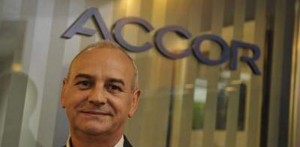How many properties Accor currently has in Indonesia? What are the targets in the long term?
Gerard Guillouet – Accor considers Indonesia as one of the top strategic markets in Asia Pacific as we are the largest hotel operator in Indonesia and has operated in the country since 1993 (20 years). We have over 9,000 employees and have built a hotel network of over 60 hotels in 20 cities nationwide, the newest hotels being MGallery Amarterra Villas Bali Nusa Dua, Grand Mercure-Maha Cipta Jakarta Harmoni, Novotel Jakarta Gajah Mada, Novotel Banjarmasin, and ibis budget Surabaya Airport hotel. Our aim is to operate at least 100 hotels and add approximately 5,000 employees across the archipelago by 2015.

Can Indonesia be considered as one of Accor’s most successful markets? If yes which are the factors of this success?
G.G. – Indonesia offers significant development opportunities for the hospitality industry as there are still an abundance of untapped destinations in Indonesia and a growing middle-class domestic travellers who are looking for international-standard accommodations and hotel brands they can trust.
Is the domestic market still the bulk of Accor’s business in Indonesia?
G.G.- Indonesia expects to attract 9 million international visitors this year, and the domestic travellers made an estimated 245 million trips last year which shows a huge growth potential for us. Due to that number, it is not a surprise, Indonesians make up over 70% of all our hotel guests in Indonesia. These domestic travellers are essential to our success in Indonesia, and we have launch several schemes to entice this particular market, such as the introduction of our booking websites in Bahasa Indonesia language; offering local promotions such as ‘Explore Indonesia’ and ‘ibis Family Super Saving’ campaigns during Ramadhan; and hiring local talents as General Managers of hotels as they understand well how to attract the domestic market.
In these past 3 months, we have opened two new Ibis hotels – ibis Styles Bali Benoa and ibis budget Surabaya Airport hotel. We can therefore safely say that there are potential for growth in all market segments, but the fastest growth will have to be in the economy segment where we currently operate 24 Ibis family hotels (Ibis, Ibis Styles and Ibis budget) with over 40 economy-scale hotels in the pipeline.
How about international markets?
G.G.- We are also seeing growth in all feeder markets, especially guests from Europe which increased 25% in Q1 compared to the same period last year and other Asian travellers which increased 37% in Q1 this year compared to last year. With more European travellers returning and an increase in international tourists from Asia, especially Japan, China, Malaysia and Singapore, we can anticipate that the spending too, will gradually increase.
What does Accor still lack in Indonesia? In which cities would the group like to be? How about the development of your luxury brand Sofitel?
G.G.- Two years ago, Accor introduced its first upscale Pullman hotel in Indonesia – Pullman Bali Legian Nirwana. This year, we are working on the final touches of the first Sofitel in Indonesia in Nusa Dua, Bali. We have now two Pullman in Jakarta and are developing another Pullman property in Bandung.
Are second-tier or third-tier cities the fastest growing segment of Indonesia’s traveller’s demand? If yes, which cities are currently growing over the average?
G.G.- As for the location, Accor tries to establish our presence in the major cities first, then move into the 2nd and 3rd tier cities that have potential to grow and where the infrastructure allows easy accessibility. More than half of our hotels are located in Jakarta and Bali, while the others are spread out throughout the country. The majority of hotels in the pipeline will still concentrate in Jakarta and Bali, however, we also see tourism potential in other second-tier cities such as Palu in Central Sulawesi, Malang in East Java, and Medan in North Sumatra.
Source: www.traveldailynews.asia
